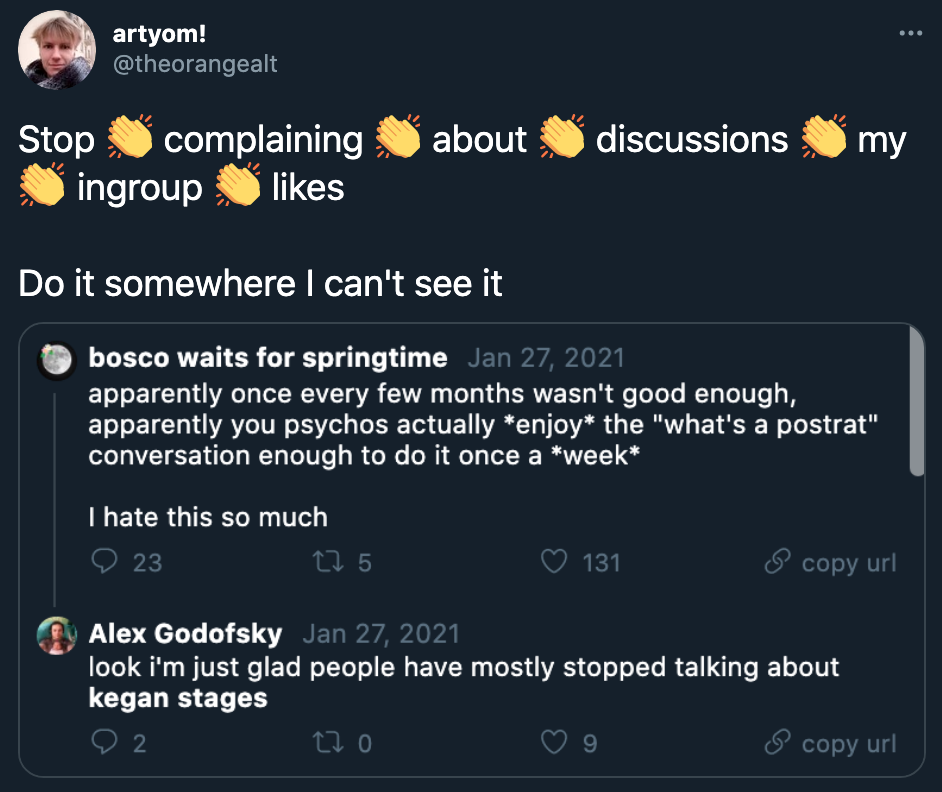Expressions of unconsidered will
I want to talk about a thing, and I will be very brief and haphazard because I'm tired of spending any time on writing posts at all.
This thing is a way of fighting. I think you should fight more, and you should be aware of when you want to fight and what about. This post will help.
Alternative title: "In favor of biting people".
Statements of fact
There are statements of fact. "This policy is wrong."
Ok.
Statements of morality
There are statements of morality. "You shouldn't hit children."
They are not described well by the framing of "beliefs".
Again: they are not described well by the framing of "beliefs". They can be shoehorned into the belief framework, but at this point my question is "and why exactly do you want to shoehorn everything into the belief framework?".
They are performative utterances. They change the social reality, similarly to how "I apologize" is the act of apologizing, and "I do" changes the reality of whether you are married or not.
Not all performative utterances are statements of morality, so I will create a subcategory for them: "expressions of considered will". They have some truth content, but only in the same way as a football kick has some truth content about where you believe the opposing team's goal is. They are best seen as actions and not statements.
Statements of emotion
Finally, there are statements of emotion. "Fuck you."
(Morality is also an emotion, but I will lump all other emotions separately from morality. Linguists don't do that, and therefore they have about twenty different categories, listed here on Wikipedia.)
Statements of emotion have even less truth content. But sometimes they might appear as if they have some truth content. "Stop talking about X" implies that talking about X is somehow bad.
I will call this category — expressions of unconsidered will.
The easiest way to turn any statement into an expression of unconsidered will is to add 👏 after each word. It has the effect of grabbing the reader by the shoulders and shaking them. Parodied brilliantly by @eigenrobot here:
everything 👏 is 👏 monocausal 👏 and 👏 specifically 👏 results 👏 from 👏 whatever 👏 shit 👏 I'm 👏 on 👏 about 👏 at 👏 any 👏 given 👏 time
Complaints are expressions of unconsidered will. Tone policing is an expression of unconsidered will. "I want everybody to stop talking about X" is an expression of unconsidered will.
The Aella example
In communities where statements of fact are preferred, people are a bit wary of saying "fuck you" directly. They phrase expressions of unconsidered will in a softer way:
So it seems for most people, the term "racism" does not refer to privilege + power; e.g., those not in power can still be racist. I think the privilege+power people should use a different word from racism so this is less confusing.
— @Aella_Girl, Feb 1, 2021; emphasis mine
And get hit back as if this was a statement of fact:
this feels like a really pure example of a "conflict theory vs. mistake theory" thing to me tbh. you're trying to analyze an almost purely conflict theory dynamic as if it were mistake theory
Followed by:
serious question: what effects do you want this to have and has it had that effect so far?
Except that of course, the replies are also not a statement of fact. The reply is a very very mild statement of semi-considered will. I don't know what QC intended but I can absolutely imagine saying the thing he said and here's what it would have meant if I had said it:
Stop 👏 doing 👏 things 👏 that 👏 won't 👏 work;
(also here's why it won't work)
"Is it intended that this is the same thing as what you're complaining about?"
The reason I am writing this post is that for the first time in my life, I feel comfortable making expressions of unconsidered will.

"Is it intended that this is the same thing as what you're complaining about?", somebody asked in replies.
It wasn't intended to be, at the moment of writing, but it finally clicked for me when I saw the reply. I was trying to masquerade an expression of unconsidered will as an expression of considered will, because I thought that all will has to be considered will. You can see me struggling with unconsidered will in Against "act, don't complain".
And the thing that clicked for me was: nope. I want to express unconsidered will so much that I have to fight myself and feel bad about not doing it and then do it anyway but in a hidden way. So why don't I just go ahead and express it directly? So I went ahead and did.
Just like there is no contradiction in two dogs biting each other, there is no contradiction in two people shouting at each other. "Is it intended that you bit him just like he bit you?" Duh.
God bless 👏 emoji.
P.S.
oh and also btw if you never express unconsidered will, it will just brood inside you, and will never turn into considered will, and also it will take you a long long time to abandon it if it's in fact dumb